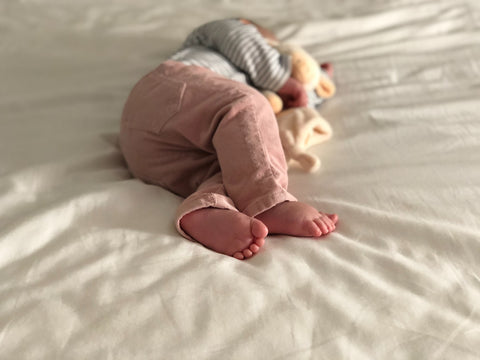Il sonno dei bambini è una parte vitale durante la crescita e lo sviluppo. Questa fase di riposo consente al corpo e alla mente del piccolo di rigenerarsi, stimolando importanti processi come lo sviluppo cerebrale, la memoria, l'apprendimento, la secrezione dell'ormone della crescita e il rafforzamento del sistema immunitario. È durante il sonno, infatti, che il cervello ha la possibilità di "ripulirsi" dalle tossine di scarto prodotte durante la veglia.
Ma, quanto sonno ha bisogno un bambino? La risposta a questa domanda varia a seconda dell'età del piccolo. Nei primi mesi di vita, un neonato può dormire anche per 15-20 ore al giorno. Man mano che cresce, il suo bisogno di sonno diminuisce gradualmente. Ad esempio, un bambino di un anno potrebbe aver bisogno di 14 ore di sonno, un bambino di due anni di 13 ore e un bambino di tre anni di 12 ore.
In questo articolo, ci concentreremo sul sonno dei bambini di uno, due e tre anni.
Analizzeremo le loro specifiche esigenze di sonno e discuteremo come i prodotti ortopedici Pharmaflex, come il materasso ortopedico per bambini appena nati, i topper ortopedici e un eventuale cuscino ortopedico, possano contribuire a garantire un sonno di qualità.
Sonno dei bambini di 1 anno
Quando un bambino compie un anno, le sue esigenze di sonno iniziano a cambiare. Da questo momento in poi, la maggior parte dei bambini di un anno necessita di circa 14 ore di sonno al giorno. Questo tempo di riposo viene solitamente suddiviso in un lungo sonno notturno e una o due “pennichelle” durante il giorno.
Il sonno dei bambini di un anno è cruciale per la loro crescita e sviluppo. Durante il sonno, il cervello del bambino lavora intensamente per elaborare le nuove competenze e le informazioni apprese durante la veglia. Il sonno consolida i processi di memoria e apprendimento, permettendo al bambino di acquisire nuove abilità come camminare, parlare e comprendere il mondo che lo circonda.

A questo stadio, un buon materasso può fare la differenza nella qualità del sonno del bambino. Un materasso ortopedico come quelli offerti da Pharmaflex, è progettato per sostenere il corpo del piccolo nella posizione corretta durante il sonno, garantendo una distribuzione ottimale del peso. Questo può prevenire eventuali problemi di allineamento della colonna vertebrale e promuovere un sonno più profondo e riposante.
È importante ricordare che ogni bambino è unico e che le sue esigenze di sonno possono variare. Quindi, sebbene 14 ore di sonno al giorno siano una media, alcuni bambini di un anno potrebbero aver bisogno di più o meno sonno. Come genitore, è fondamentale rispettare i ritmi naturali del tuo bambino e creare un ambiente di sonno confortevole e rilassante.
Sonno dei bambini di 2 anni
Il sonno dei bambini di 2 anni continua a essere un elemento fondamentale per il loro benessere e sviluppo. A questa età, la maggior parte dei bambini ha bisogno di circa 13 ore di sonno al giorno. Questo tempo di sonno si divide generalmente in un periodo notturno di 11-12 ore e una pennichella di 1-2 ore durante il giorno.
Le esigenze di sonno di un bambino di 2 anni differiscono da quelle di un bambino di 1 anno. Mentre i bambini di 1 anno tendono a fare due pennichelle durante il giorno, a 2 anni la maggior parte dei bambini passa a una sola pennichella pomeridiana.

Per garantire un sonno adeguato e di qualità per il tuo bambino di 2 anni, potrebbe essere utile considerare l'aggiunta di un topper ortopedico al materasso. I topper ortopedici Pharmaflex sono progettati per offrire un ulteriore strato di comfort e sostegno, migliorando la qualità del sonno.
Un topper ortopedico può contribuire a una distribuzione ottimale del peso del corpo durante il sonno, favorendo un allineamento corretto della colonna vertebrale e un sonno più riposante e rigenerante.
Sonno dei bambini di 3 anni
Al raggiungimento dei tre anni, le esigenze di sonno dei bambini continuano ad evolversi. In questa fase, un bambino necessita di circa 12 ore di sonno al giorno, con la pennichella pomeridiana che inizia a ridursi o, in alcuni casi, a scomparire del tutto.
Il sonno notturno ininterrotto diventa sempre più importante e per garantire un riposo di qualità, l'introduzione di un cuscino ortopedico può fare una grande differenza.
I cuscini ortopedici Pharmaflex sono progettati per offrire un supporto ottimale alla testa e al collo del bambino, promuovendo un allineamento corretto della colonna vertebrale. Questo può contribuire a un sonno più profondo e riposante, oltre a prevenire problemi come il torcicollo.
È importante continuare a rispettare una routine di sonno costante e rilassante. Limitare l'uso di dispositivi elettronici prima della nanna e mantenere un ambiente di sonno tranquillo, buio e a una temperatura confortevole, possono essere utili per incoraggiare un sonno di qualità.
Ricorda, ogni bambino è unico e le esigenze di sonno possono variare. Non dimenticare di ascoltare e osservare il tuo bambino per capire le sue esigenze specifiche e fare in modo che il sonno sia un'esperienza positiva e ristoratrice.







